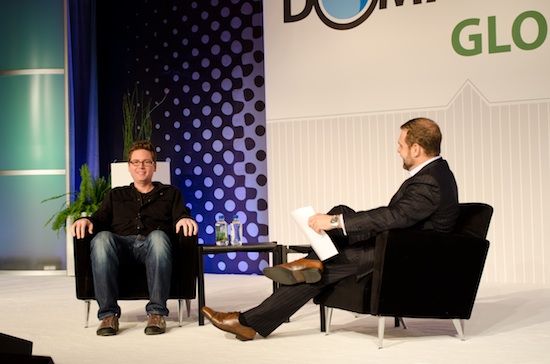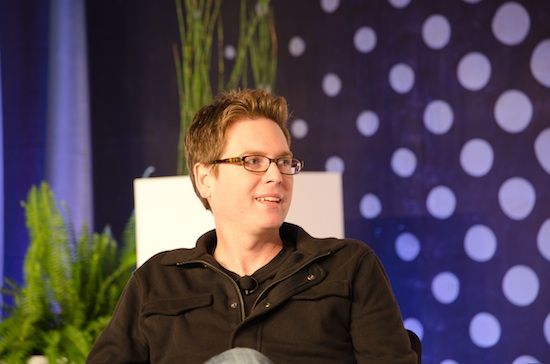Wednesday night was a blast beginning at the Petersen Auto Museum and ending at the Viper Room in West Hollywood. Surprisingly we still managed to get more than six hours of sleep which is a rarity at conferences but leaves us with lots of energy for the last party of DOMAINfest taking place tonight at the House Of Blues on the Sunset Strip.

We started-off the third day of the conference with the keynote address by Biz Stone, the Founder of Twitter. DOMAINfest has always hit it out of the park with keynote speakers and I couldn’t think of a better choice than Biz. While there is no replacement for being here in person you can read a brief summary below:
- Biz grew up in a wealthy Boston suburb and ended-up starting a Lacross team at his school. From this experience he learned that opportunities can be manufactured.
- Started tinkering with electronics at a young age – Biz would tell his Mom, “I’m going downstairs to invent things.”
- Biz always worked, even when he was 10 he would go door-to-door asking neighbors if he could mow their lawns. After that he worked at the grocery store but he didn’t look at work as a way to make money but instead just as something that you do.
- In High School Biz decided that he would not do homework, told his teachers that he would listen in class but he wasn’t going to do homework.
- Went to college at UMass where he was able to get a job as a designer which was an amazing experience and gave Biz the opportunity to learn graphic design. The most important thing he got out of this experience was that creativity is a renewable resource, it is something that you can always tap.

- Biz had worked with Evan Williams at Blogger and Evan had the team brainstorming new ideas. Biz came-up with an idea called “Side Blogging” where short, SMS-like messages could be displayed on the side of the blog. This continued to evolve and became Twitter.
- When they were thinking of names “Jitter” was one of the first ideas however they felt this had too frenetic of a connotation. So they decided to look at other similar names, looking through the dictionary they found Twitter and the name was picked. Initially they didn’t buy Twitter.com but as things started to take-off the approached the owner who was using it for a site with bird photos on it. They were able to acquire the name for $7,500.
- As things really started to take-off and Twitter was a real success they met with Mark Zuckerberg from Facebook in Palo Alto. Sitting with Mark he said, “I don’t like to talk about numbers,” but asked them to throw-out a number, so they said, “500 million” thinking the number would be far beyond what they could get.
- In the end Facebook came-up with a package that met their number but Biz and Mark decided not to sell. Evan believe that if people valued them at 500 million, they were really worth a billion.
- Biz and Evan started a company called The Obvious Corporation, a company with the goal of making systems that help people work together to improve the world.
- They realized that while they loved hearing pitches, funding companies wasn’t the right fit for them. So they changed the focus to mentor and help companies by providing them with office space, marketing, and the support they need to really make something great.
- The next phase of the internet is I + U = A, which means information + understanding = action. The future really is the digital leaping into reality. Technology can now really impact world events.
- The next phase is – what does innovation look like on top of a globally connected world? Biz feels this means people will actually be able to learn more and stay connected in ways they haven’t been able to before.
- The future metric for success is what kind of positive impact are we making in the world, are we getting smarter, etc.
- “To succeed spectacularly you have to be prepared to fail spectacularly”
I also took a couple of great videos which I will be posting on You Tube soon. This was definitely one of the best talks I’ve ever been to at any conference, Biz is energetic, inspiring, and most importantly – he truly wants to make a difference in the world. It can be easy for all of us to get so involved in our work that we forget the social consequences or impact that we can have. We all have the opportunity to do something great, not just for us ourselves but for us as a global community.
